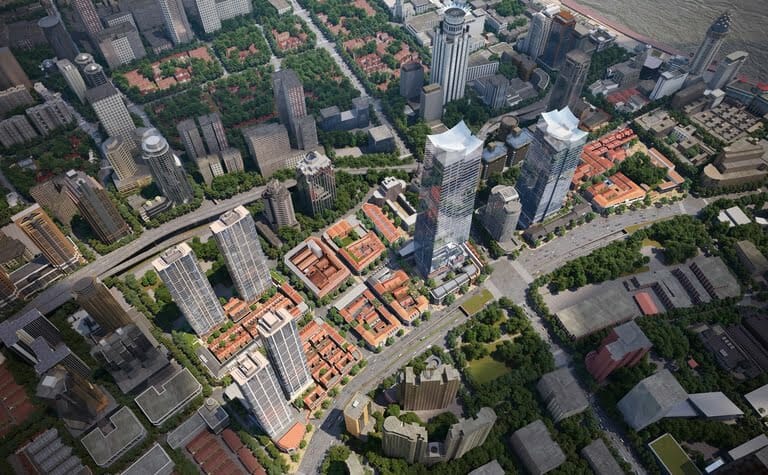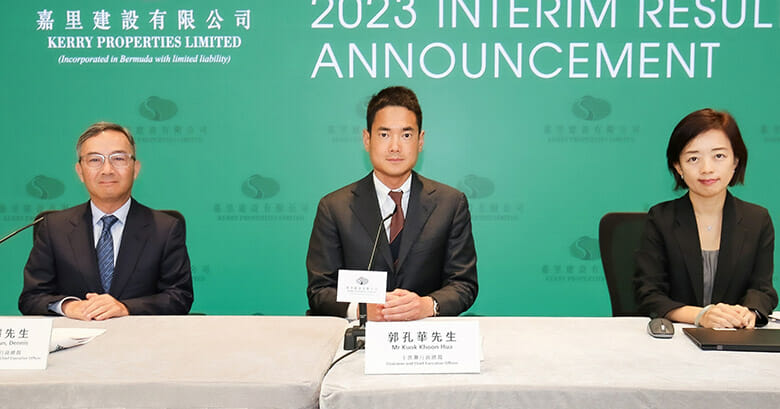
Kerry recently broke ground on its Jinling Road project in Shanghai (Image: Kerry Properties)
Kerry Properties posted a 37 percent year-on-year drop in first-half profit, as the builder controlled by the family of Shangri-La Hotel tycoon Robert Kuok saw results moderate after exceptional gains from selling two Hong Kong warehouses in the prior-year period.
The developer’s profit attributable to shareholders in the first six months of 2023 totalled HK$1.74 billion, down from HK$2.75 billion a year earlier, Kerry said Tuesday in a filing with the Hong Kong stock exchange. Underlying profit, which adjusts for one-off credits and charges, rose 15 percent from the HK$1.51 billion recorded in last year’s first half.
Revenue from property sales jumped 24 percent year-on-year to HK$2.12 billion, and hotel revenue performed even better, doubling to HK$851 million. But revenue from property rentals and other sources was flat at HK$2.5 billion, owing to foreign exchange impacts and the loss of rental revenue from the disposed warehouses.
“During this period we saw an improvement in the business environment as compared with the same period in 2022,” said chairman and CEO Kuok Khoon Hua. “However, the post-COVID recovery has fallen short of what we had expected and the property markets in both Hong Kong and the mainland remain weak.”
Lacklustre Outlook
In his chairman’s statement, Kuok lamented the disappointing economic data out of mainland China since a brief rebound in the first quarter of 2023, even as Beijing has sought to boost the property market through measures designed to support home users and promote stability.

Chairman and CEO Kuok Khoon Hua (centre) with deputy CEO Dennis Au and CFO Suzanne Cheng
“Save for any impactful stimulus from the mainland government, we expect the property markets in Hong Kong and on the mainland to remain lacklustre in the foreseeable future,” he said. “Businesses and investors remain cautious and non-committal after three years of COVID-related restrictions and slower-than-expected recovery.”
In Hong Kong, meanwhile, higher interest rates have translated into higher costs of homeownership, dampening the sentiment of the residential market, said Kuok, who is Robert Kuok’s youngest son.
Kerry nonetheless delivered what it termed a “decent” performance in the first half of the year, with development properties well received in Hong Kong, Hangzhou and Shanghai. The retail and office portfolio delivered steady rental income as hotels felt the updraft from resumed business activities and leisure travel.
“While we remain positive on the longer-term fundamentals of both markets, we recognise that sentiment and market confidence will need more time to rebuild,” the chairman said. “In line with our more cautious approach, we will be focusing on delivering projects under development, asset optimisation, and delaying all unnecessary capital expenditure.”
Shanghai Ground-Breaking
Kerry’s own long-term plans include a project set to provide nearly 93 football fields of finished space in Shanghai’s Huangpu district, in what would be the company’s largest development to date in mainland China.
Kerry this month officially commenced construction of its Kerry Jinling Road project, which will span 663,000 square metres (7.2 million square feet) of office, residential, retail and hotel space near the city’s Yu Garden landmark.
The development occupies 10 adjoining plots along East Jinling Road acquired by Kerry in a pair of separate government tenders in June and January of last year. The company spent a total of RMB 22.1 billion (now $3 billion) to assemble the 216,000 square metre site, or the equivalent of RMB 33,303 per square metre of gross floor area.
“This project will strengthen the group’s development properties pipeline for good medium-term profits, and fortify its investment properties portfolio in metropolitan Shanghai by increasing its stable recurrent revenue base in the long term,” Kerry said in Tuesday’s filing.
Leave a Reply